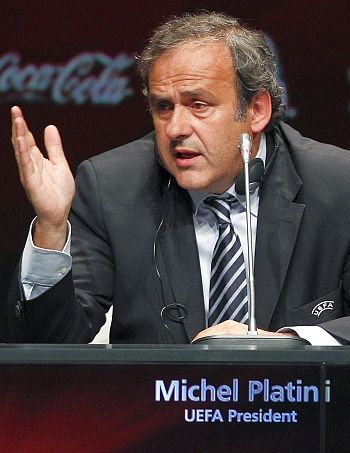UEFA president Michel Platini has repeated his call for the "triple punishment" of red card, penalty and suspension to be dropped following two controversial dismissals in the Champions League this week.
- Barcelona teach City a lesson; Pellegrini questions impartiality of referee
- Wenger furious with referee for 'decision that basically killed the game'
The triple punishment follows when the referee dismisses a player for an offence in the penalty area which he judges has denied an attacker an obvious goal-scoring opportunity.
 On Tuesday Manchester City defender Martin Demichelis was sent off for lunging in on his Argentine compatriot Lionel Messi of Barcelona and on Wednesday Arsenal keeper Wojciech Szczesny was dismissed for clattering into Bayern Munich's Arjen Robben.
On Tuesday Manchester City defender Martin Demichelis was sent off for lunging in on his Argentine compatriot Lionel Messi of Barcelona and on Wednesday Arsenal keeper Wojciech Szczesny was dismissed for clattering into Bayern Munich's Arjen Robben.
City and Arsenal, reduced to 10 men for sizeable periods of their games, were both beaten 2-0 at home by their opponents, making their progress in the competition unlikely.
Arsenal manager Arsene Wenger said Italian referee Nicola Rizzoli had "killed the game" by sending off Szczesny.
Speaking at a news conference on Saturday before the draw for the qualifying rounds of Euro 2016 Platini said: "For 15 years we have been trying to change this rule. All the technical committees of UEFA and FIFA are against this but when it has gone to the International Board (IFAB) it doesn't change,"
"Arsene Wenger said the referee killed the game but the referee had no choice -- he has to respect this stupid rule."
In his programme notes for Saturday's Premier League match against Sunderland, Wenger wrote:
"I believe that inside the (penalty) box you should have a different rule because denying a goal-scoring opportunity is of course a penalty, so when you give the penalty you restore the goal-scoring opportunity.
"Giving them a penalty was a better goal-scoring opportunity than the chance that Arjen Robben had because he had lost the ball.
"Overall I think it's double punishment. That's where I believe the rules have to change, because the importance of the decision is not linked at all to what happened. It has too high an influence on the outcome of the game."
MEETING
UEFA's executive committee has proposed that the issue should be included on the agenda at next week's meeting of the International Football Association Board (IFAB), the game's ultimate law-making body.
"I am against it, and I want it to be changed," Platini said.
The Frenchman has previously outlined other possible sanctions and would also prefer the referee to have more discretion and for the award of a penalty to not automatically mean he has to issue a red card.
"I would change the system of cautions," he said in December.
"I would do it like in rugby, where the perpetrator would be punished by being off the pitch for 10 or 15 minutes of the game. That means the team they are facing would benefit in the same match."
FIFA president Sepp Blatter, who will chair next week's IFAB meeting in Switzerland, has a different view from Platini, maintaining the sanction is a fit and proper punishment.
The IFAB, comprising four voting members from FIFA and four from the British FA, needs a 75 percent majority for a law to be changed.
However, UEFA is pressing ahead with its plans to try to have the law amended.
"The (UEFA) executive committee has asked IFAB to address the issue and clarify the situation at their next meeting so that there are no more red cards for fouls committed inside the box," UEFA general secretary Gianni Infantino said.
"We need to resolve the issue of the 'triple punishment' once and for all. Everyone is talking about it and feels it is an injustice."










